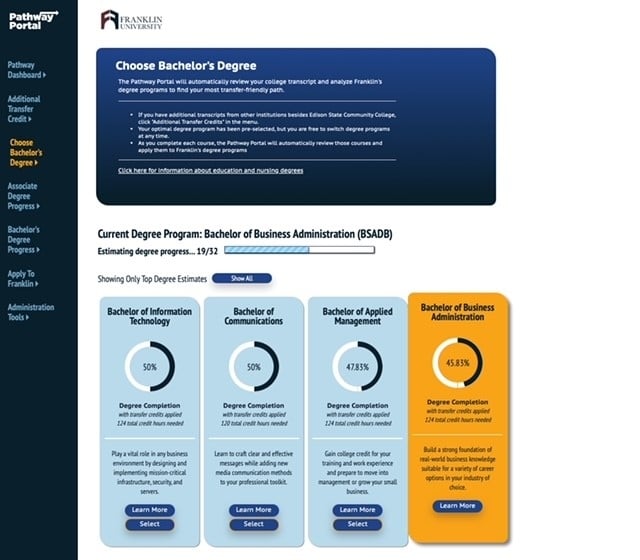You have /5 articles left.
Sign up for a free account or log in.

Franklin University in Ohio created a transfer portal for learners attending a partner community college, which shows degree progression and available transfer credits.
Franklin University
A November survey by the Center for Community College Student Engagement found 47 percent of community college students were unaware of transfer assistance programs available. Among those who did know about a program, only 24 percent utilized the service.
Franklin University in Ohio launched a new website, the Pathway Portal, in March to streamline transfer and application processes for students attending a partner community college. The portal creates a personalized dashboard of courses students have completed and how they match Franklin’s bachelor’s degrees. Students can also complete their application to Franklin directly through the portal once they’ve hit the credit threshold.
New this fall, incoming students who utilize the Pathway Portal can receive a discounted tuition rate of $298 per credit. Over 2,900 students have opted in to the new tool across 27 community colleges, and around 500 students have been admitted to Franklin since the site’s launch.
What’s the need: The No. 1 question community college students ask Franklin staff is how their credits will transfer, says Bill Chan, senior vice president of strategic alliances. Transfer processes, beyond being confusing for students, can also result in loss of time and credit toward degree.
A 2017 U.S. Government Accountability Office study found the average student lost 43 percent of credits when transferring, or around 13 credits. Students moving from a four-year public to a four-year private nonprofit institution, on average, lose around 37 percent of credits, according to the GAO (the study did not measure credit loss between two-year publics and four-year private nonprofits).
Successful credit transfer can also mean higher levels of completion—community college students who were able to transfer most of their credits are 2.5 times more likely to attain a bachelor’s degree, compared to their peers who transferred fewer than half of their credits, according a 2015 study.
How it works: Franklin University leaders partnered with Edison State Community College to pilot the portal in spring 2022. The development process took about six to eight months, and all IT was done in house, Chan says.
“We are forever thankful to Edison State for helping us take this idea and actually make it into a functioning transfer tool,” Chan says.
Any student attending a partnering community college can create a free, online account with Franklin. The portal pulls info from Franklin’s database of transfer courses to show where credits can be applied, and community colleges digitally submit the students’ transcripts each term to provide updated information on degree progression.
The portal also gives students the option to select one of 28 bachelor’s degree programs to see how their current courses meet degree requirements and other relevant courses that will earn them credit at Franklin.
Students have access to the portal 24-7, aiding them in their term scheduling and serving as benchmarks to their associate degree. Community college advisers also have access to the portal, Chan says.
Once students complete 50 credit hours, they can apply directly to Franklin within the portal, as well, making them eligible for a special tuition of $298 per credit. The pathway dashboard will automatically notify students when they’re eligible to transfer and guide them through the process, and they don’t have to request a transcript from their college because it’s already embedded in portal data, Chan says.
The impact: As of Dec. 1, 2,922 students have opted to use the portal, 1,300 students have applied to Franklin and 500 have enrolled, Chan says. The university has 27 Pathway Partner community colleges across Ohio, as well as in Pennsylvania and Kentucky.
The portal works in conjunction with Franklin’s 3+1 program, which is an articulation agreement that adds additional transfer credits to save students money and reduce the number of courses they complete at Franklin.
University leaders have also found the portal can be leveraged to incentivize a student to complete an associate degree. Having a credential is important both to community college partners and to students, so seeing how close they are to completing can be an additional push, Chan explains.
Seeking stories from campus leaders, faculty members and staff for our Student Success focus. Share here.




